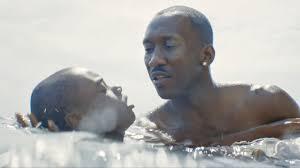
"At some point, you gotta decide for yourself who you're going to be."
What a marvelous film Moonlight (2016) is, sensitive, searching and attuned to human faults. It's a shame that the movie is associated with an egregious Oscar snafu, when it's Best Picture award was well-earned.Barry Jenkins' movie captures three vignettes in the life of Chiron, an African-American boy from Liberty City, Miami. As a child (Alex Hibbert) called Little, he flees from his prostitute mother Paula(Naomie Harris) while forming a friendship with drug dealer Juan (Mahershala Ali) and his girlfriend Teresa (Janelle Monae). As a teenager (Ashton Sanders), he's bullied at school while wrestling with his sexual identity. As an adult (Trevante Rhodes) nicknamed Black, he relocates to Atlanta and becomes a criminal, but a chance phone call from school friend Kevin (Andre Holland) brings him back to Miami.
Based on an unpublished play, Moonlight evinces an utterly absorbing humanity despite lacking a firm dramatic structure. Its scenes capture a mood and lifestyle more than plot, with Jenkins showing the miserable conditions of poor Southern blacks, holding out little hope for advancement beyond making life tolerable. Some turn to crime, others to drugs, others to furtive relationships that can only end in heartbreak. All of this registers on a tonal level, quietly emotional yet utterly devastating.
Jenkins peels away stereotypes for a probing mediation on masculinity. Chiron is marked as a "faggot" from an early age, tormented by classmates while he's puzzling out his identity. A beachside tryst with Kevin offers fleeting pleasure and lingering embarrassment, as Kevin's forced to prove his manhood by punching out Chiron (who, unwilling to hurt his friend, seeks collateral vengeance). Chiron becomes a drug dealer sporting gold teeth and blaring rap music, caricaturing the Angry Black Man. Encounters with his mother and Kevin cause Chiron to realize he's never had an identity of his own, defined by his nicknames more than his actions.

Moonlight's aimless, drifting style mostly avoids easy tragedy (only the teenage section flirts with cliché) or familiar story beats. Jenkins contrasts run-down neighborhoods with the eerie beauty of the beach, whose moonlight beauty and comforting waves offer highpoints in his existence. The movie does tend towards showiness, with stylized dream sequences, James Laxton's neon-and-shadows photography and occasional slow motion, but topped with Nicholas Britell's low-key score it only ads to the atmosphere.
It's impossible to fault the cast. Mahershala Ali and Janelle Monae are quietly likeable, with Ali especially struggling to reconcile his good nature with his sordid work. Naomie Harris earned an Oscar nod for her work, veering between sad defiance and beaten-down regret in a devastating portrayal. Young Alex Hibbert and Ashton Sanders do well with characters who mostly react, with Trevante Rhodes offering insecurity covered by muscular swagger. Andre Holland's quite moving as Kevin, whose resigned, happy banality provides a heartbreaking foil.
That Moonlight, a modestly-budgeted character study, won Best Picture against a musical romance, an epic war film and other more predictable picks, may well have been a response to the "Oscars So White" backlash in previous years. Whatever the optics, Moonlight was the right choice. It's more tone poem than movie, a mood piece that haunts viewers long after the credits roll.

